| Listing 1 - 10 of 15 | << page >> |
Sort by
|
Book
ISBN: 1282851098 9786612851094 077356165X 9780773561656 0773506500 9780773506503 Year: 1988 Publisher: Kingston [Ont.] : McGill-Queen's University Press,
Abstract | Keywords | Export | Availability | Bookmark
 Loading...
Loading...Choose an application
- Reference Manager
- EndNote
- RefWorks (Direct export to RefWorks)
From the introduction: "Folk-tales are the verbal account of the world view and way of life of a people. They hold a special importance when the people lack a formal system of writing. For a thousand years the philosophy, religion, morals, customs, and ideas of the Iroquoian people were perpetuated by means of the spoken word. Folklore may explain the origin of man, animals, plants, and the world. Codes of behaviour, ethics, and social mores are validated in accounts which describe, for example, heroic or malicious deeds. Story- telling was used to socialize and instruct young people and acted as a social cohesive for the whole group." The tales which Rona Rustige has collected contain many folkloric motifs which relate them to other Iroquoian literatures. In the context of this body of Iroquoian folklore the tales take on a broader significance and their preservation allows for future systematic study.
Mohawk Indians --- Indians of North America --- Tales --- Folk-lore, Indian --- Canienga Indians --- Caughnawaga Indians --- Kaniakehaka Indians --- Mohaqu Indians --- Mohaux Indians --- Mohogiea Indians --- Oka Indians --- Saint Regis Indians --- Iroquois Indians
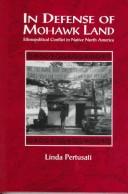
ISBN: 0585092494 9780585092492 0791432114 0791432122 143841594X Year: 1997 Publisher: Albany : State University of New York Press,
Abstract | Keywords | Export | Availability | Bookmark
 Loading...
Loading...Choose an application
- Reference Manager
- EndNote
- RefWorks (Direct export to RefWorks)
Mohawk Indians --- Canienga Indians --- Caughnawaga Indians --- Kaniakehaka Indians --- Mohaqu Indians --- Mohaux Indians --- Mohogiea Indians --- Oka Indians --- Saint Regis Indians --- Indians of North America --- Iroquois Indians --- Politics and government. --- Land tenure. --- Ethnic identity. --- Oka (Québec) --- Ethnic relations. --- Oka (Québec)
Book
ISBN: 1438471076 9781438471075 9781438471068 1438471068 Year: 2018 Publisher: Albany : Excelsior Editions, an imprint of the State University of New York Press,
Abstract | Keywords | Export | Availability | Bookmark
 Loading...
Loading...Choose an application
- Reference Manager
- EndNote
- RefWorks (Direct export to RefWorks)
"Maurice Kenny's career as a writer, teacher, publisher, and storyteller spanned more than six decades, over the course of which he published more than thirty books and became one of the most prominent voices in American poetry. From the early 1970s onward, he was an instrumental part of the resurgence of Native American literature through his celebrated volumes of poetry and work as an editor and publisher with the journal Contact/II and with the Strawberry Press. This bittersweet memoir sets the stage for this rich literary life by recounting its tumultuous "first half...plus a bit," a time during which he moved through a series of worlds that all left their marks on him. Kenny begins with his early years spent among his family in the small northern New York city of Watertown. After an adolescence marked by both significant awakenings and grievous traumas, Kenny sets out to seek his fortunes and find his poetic voice, landing for a while in the Jim Crow-era South, in St. Louis, in Indiana, and finally back in New York City, where he becomes part of a motley creative realm of performers and poets that offers him both fascinated inspiration and disheartening rejection. These recollections conclude with Kenny's maturation into a poet whose reaffirmed indigenous heritage unified an artistic vision that remained in conversation with a wide range of other themes and traditions until his death in April 2016."--
Authors, American --- Mohawk Indians --- Canienga Indians --- Caughnawaga Indians --- Kaniakehaka Indians --- Mohaqu Indians --- Mohaux Indians --- Mohogiea Indians --- Oka Indians --- Saint Regis Indians --- Indians of North America --- Iroquois Indians --- Kenny, Maurice,
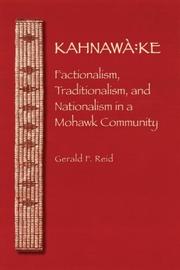
ISBN: 9786610374335 1280374330 0803204388 9780803204386 9781280374333 0803239467 9780803239463 6610374333 Year: 2004 Publisher: Lincoln : Baltimore, Md. : University of Nebraska Press, Project MUSE,
Abstract | Keywords | Export | Availability | Bookmark
 Loading...
Loading...Choose an application
- Reference Manager
- EndNote
- RefWorks (Direct export to RefWorks)
"Today Kahnawa:ke ("at the rapids") is a community of approximately seventy-two hundred Mohawks, located on the south shore of the Saint Lawrence River near Montreal. One of the largest Mohawk communities, it is known in the modern era for its activism - a traditionalist, energetic impulse with a long history. Kahnawa:ke examines the development of traditionalism and nationalism in this Kanien keka:ka (Mohawk) community from 1870 to 1940." "Drawing on primary documents and numerous oral histories, Kahnawa:ke provides a detailed ethnohistory of a major Kanien'keka:ka community at a turbulent and transformative time in its history and the history of the Iroquois Confederacy. It not only makes an important contribution to the understanding of this vital but little studied community but also sheds new light on recent Iroquois history and Native political and cultural revitalization."--Jacket.
Mohawk Indians --- Canienga Indians --- Caughnawaga Indians --- Kaniakehaka Indians --- Mohaqu Indians --- Mohaux Indians --- Mohogiea Indians --- Oka Indians --- Saint Regis Indians --- Indians of North America --- Iroquois Indians --- Politics and government. --- Social conditions. --- History. --- Kahnawake Indian Reserve (Quebec) --- Kahnawake Indian Reservation (Québec) --- Social life and customs. --- Kahnawake Indian Reserve (Québec)
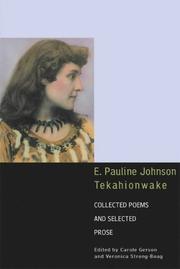
ISBN: 1282022873 9786612022876 1442674156 9781442674158 9780802036704 0802036708 0802084974 Year: 2020 Publisher: Toronto : University of Toronto Press,
Abstract | Keywords | Export | Availability | Bookmark
 Loading...
Loading...Choose an application
- Reference Manager
- EndNote
- RefWorks (Direct export to RefWorks)
E. Pauline Johnson (Tekahionwake) was a Native advocate of part-Mohawk ancestry, an independent woman during the period of first-wave feminism, a Canadian nationalist who also advocated strengthening the link to imperial England, a popular and versatile prose writer, and one of modern Canada's best-selling poets. Johnson longed to see the publication of a complete collection of her verse, but that wish remained unfulfilled during her life. Nine decades after her death, the first complete collection of all of Pauline Johnson's known poems, many painstakingly culled from newspapers, magazines, and archives, is now available. In response to the current recognition of Johnson's historical position as an immensely popular and influential figure of the late nineteenth and early twentieth centuries, this volume also presents a representative selection of her prose, including fiction about native-settler relations, journalism about women and recreation, and discussions of gender roles and racial stereotypes. Edited by Carole Gerson and Veronica Strong-Boag, authors of the enthusiastically received Paddling Her Own Canoe: Times and Texts of E. Pauline Johnson (Tekahionwake), this collection exhibits the same impeccable scholarship and is essential to a full understanding of Johnson as a major Canadian writer and cultural figure.
Indians of North America --- Mohawk Indians --- Feminism --- Women --- Canienga Indians --- Caughnawaga Indians --- Kaniakehaka Indians --- Mohaqu Indians --- Mohaux Indians --- Mohogiea Indians --- Oka Indians --- Saint Regis Indians --- Iroquois Indians --- American aborigines --- American Indians --- First Nations (North America) --- Indians of the United States --- Indigenous peoples --- Native Americans --- North American Indians --- Culture --- Ethnology --- Canada
Book
ISBN: 9780822356431 0822356430 9780822356554 0822356554 0822376784 Year: 2014 Publisher: Durham, N.C. Duke University Press
Abstract | Keywords | Export | Availability | Bookmark
 Loading...
Loading...Choose an application
- Reference Manager
- EndNote
- RefWorks (Direct export to RefWorks)
"Mohawk Interruptus is a bold challenge to dominant thinking in the fields of Native studies and anthropology. Combining political theory with ethnographic research among the Mohawks of Kahnawà:ke, a reserve community in what is now southwestern Quebec, Audra Simpson examines their struggles to articulate and maintain political sovereignty through centuries of settler colonialism. The Kahnawà:ke Mohawks are part of the Haudenosaunee or Iroquois Confederacy. Like many Iroquois peoples, they insist on the integrity of Haudenosaunee governance and refuse American or Canadian citizenship. Audra Simpson thinks through this politics of refusal, which stands in stark contrast to the politics of cultural recognition. Tracing the implications of refusal, Simpson argues that one sovereign political order can exist nested within a sovereign state, albeit with enormous tension around issues of jurisdiction and legitimacy. Finally, Simpson critiques anthropologists and political scientists, whom, she argues, have too readily accepted the assumption that the colonial project is complete. Belying that notion, Mohawk Interruptus calls for and demonstrates more robust and evenhanded forms of inquiry into indigenous politics in the teeth of settler governance."--Publisher information.
Mohawk Indians --- #SBIB:39A74 --- #SBIB:39A6 --- Canienga Indians --- Caughnawaga Indians --- Kaniakehaka Indians --- Mohaqu Indians --- Mohaux Indians --- Mohogiea Indians --- Oka Indians --- Saint Regis Indians --- Indians of North America --- Iroquois Indians --- Ethnic identity --- History --- Etnografie: Amerika --- Etniciteit / Migratiebeleid en -problemen --- Political sociology --- Ethnology. Cultural anthropology --- Quebec [Province]
Book
ISBN: 0300240414 0300227817 9780300240412 9780300227819 9780300227819 Year: 2018 Publisher: New Haven, CT : Yale University Press,
Abstract | Keywords | Export | Availability | Bookmark
 Loading...
Loading...Choose an application
- Reference Manager
- EndNote
- RefWorks (Direct export to RefWorks)
The first book-length biography of Richard Oakes, a Red Power activist of the 1960s who was a leader in the Alcatraz takeover and the Red Power Indigenous rights movement A revealing portrait of Richard Oakes, the brilliant, charismatic Native American leader who was instrumental in the takeovers of Alcatraz, Fort Lawton, and Pit River and whose assassination in 1972 galvanized the Trail of Broken Treaties march on Washington, DC. The life of this pivotal Akwesasne Mohawk activist is explored in an important new biography based on extensive archival research and key interviews with activists and family members. Historian Kent Blansett offers a transformative and new perspective on the Red Power movement of the turbulent 1960s and the dynamic figure who helped to organize and champion it, telling the full story of Oakes's life, his fight for Native American self-determination, and his tragic, untimely death. This invaluable history chronicles the mid-twentieth century rise of Intertribalism, Indian Cities, and a national political awakening that continues to shape Indigenous politics and activism to this day. TEST
Mohawk Indians --- HISTORY / Native American. --- Canienga Indians --- Caughnawaga Indians --- Kaniakehaka Indians --- Mohaqu Indians --- Mohaux Indians --- Mohogiea Indians --- Oka Indians --- Saint Regis Indians --- Indians of North America --- Iroquois Indians --- Oakes, Richard, --- American Indian Movement --- AIM (American Indian Movement) --- Movimiento Nativo Americano --- History. --- Indian Occupation of Alcatraz Island (California : 1969-1971) --- 1969-1971 --- Alcatraz Island (Calif.) --- California --- History
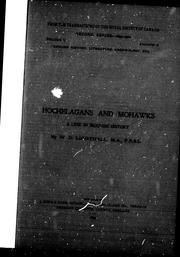
ISBN: 0665243006 9700000014777 Year: 1899 Publisher: [Ottawa? : (Ottawa : publisher not identified], J. Hope)
Abstract | Keywords | Export | Availability | Bookmark
 Loading...
Loading...Choose an application
- Reference Manager
- EndNote
- RefWorks (Direct export to RefWorks)
Indiens d'Amérique --- Iroquois Indians. --- Mohawk Indians. --- Indians of North America --- Iroquois (Indiens) --- Mohawk (Indiens) --- Histoire. --- History. --- American aborigines --- American Indians --- First Nations (North America) --- Indians of the United States --- Indigenous peoples --- Native Americans --- North American Indians --- Canienga Indians --- Caughnawaga Indians --- Kaniakehaka Indians --- Mohaqu Indians --- Mohaux Indians --- Mohogiea Indians --- Oka Indians --- Saint Regis Indians --- Iroquois Indians --- Agoneaseah Indians --- Massawomeke Indians --- Mengwe Indians --- Iroquoian Indians --- Culture --- Ethnology --- Autochtones
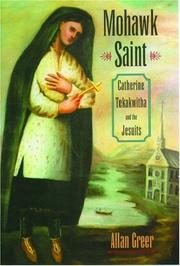
ISBN: 0199884072 128042821X 0198038992 1602565155 9780198038993 1423746090 9781423746096 9780195174878 0195174879 9781280428210 0195174879 0195309340 9780195309348 Year: 2005 Publisher: Oxford ; New York : Oxford University Press,
Abstract | Keywords | Export | Availability | Bookmark
 Loading...
Loading...Choose an application
- Reference Manager
- EndNote
- RefWorks (Direct export to RefWorks)
Catherine/Kateri Tekakwitha (1656-1680) has become known over the centuries as a holy Catholic convert. She is revered as the first Native North American proposed for sainthood. This book presents her story along with Claude Chauchetiere, a French Jesuit, who came to America hoping to rescue savages from sin and paganism.
Mohawk women --- Mohawk Indians --- Women saints --- Saints, Women --- Saints --- Canienga Indians --- Caughnawaga Indians --- Kaniakehaka Indians --- Mohaqu Indians --- Mohaux Indians --- Mohogiea Indians --- Oka Indians --- Saint Regis Indians --- Indians of North America --- Iroquois Indians --- Women, Mohawk --- Women --- Religion. --- Tekakwitha, Kateri, --- Chauchetière, Claude, --- Jesuits --- イエズス会 --- カトリック イエズス会 --- Compagnie de Jésus --- Compañia de Jesus --- Gesellschaft Jesu --- Jesuitas --- Jesuiten --- Jesuiti --- Jezuïten --- Jésuites --- Paters Jezuïten --- Societeit van Jezus --- Society of Jesus --- Missions --- History. --- Chauchetiere, Claude,
Book
ISBN: 1469631601 9781469631608 146963161X 9781469631615 9781469631592 1469631598 9798890851659 Year: 2017 Publisher: Chapel Hill : Baltimore, Md. : The University of North Carolina Press, Project MUSE,
Abstract | Keywords | Export | Availability | Bookmark
 Loading...
Loading...Choose an application
- Reference Manager
- EndNote
- RefWorks (Direct export to RefWorks)
After a decade of chasing stories around the globe, travel writer Stephanie Elizondo Griest followed the magnetic pull home - only to discover that her native South Texas had been transformed in her absence. In this work, she weaves seven years of stories into a meditation on the existential impact of international borderlines.
Mohawk Indians --- Mexican Americans --- Canienga Indians --- Caughnawaga Indians --- Kaniakehaka Indians --- Mohaqu Indians --- Mohaux Indians --- Mohogiea Indians --- Oka Indians --- Saint Regis Indians --- Indians of North America --- Iroquois Indians --- Canadian-American Border Region. --- Mexican-American Border Region. --- American-Canadian Border Region --- Border Region, American-Canadian --- Border Region, Canadian-American --- Borderlands (Canada and U.S.) --- Canada-United States Border Region --- U.S.-Canada Border Region --- United States-Canada Border Region --- American-Mexican Border Region --- Border Region, American-Mexican --- Border Region, Mexican-American --- Borderlands (Mexico and U.S.) --- Mexico-United States Border Region --- Tierras Fronterizas de México-Estados Unidos --- United States-Mexico Border Region
| Listing 1 - 10 of 15 | << page >> |
Sort by
|

 Search
Search Feedback
Feedback About UniCat
About UniCat  Help
Help News
News